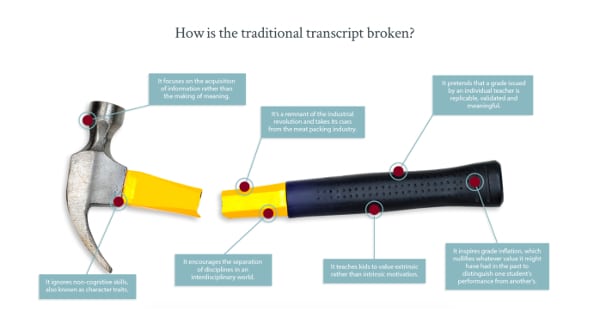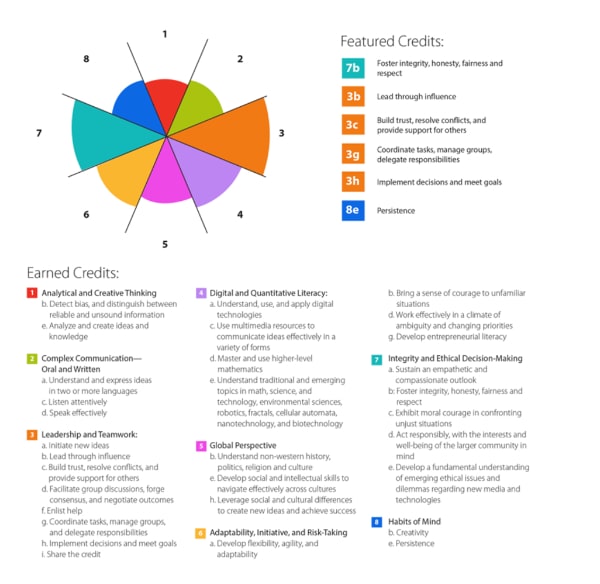School Consortium Proposes a Better Transcript
CompetencyWorks Blog
This post originally appeared at Getting Smart on September 14, 2017.
For 125 years we’ve recorded the high school experience as a series of courses and grades. It’s a record of activity but not a very good measure of knowledge, skills and dispositions; it doesn’t capture experiences or work products that provide evidence of growth and accomplishment.
Scott Looney, head at the Hawken School in Cleveland since 2006, is an advocate for advanced student-centered and authentic learning. He knew there was a better way to signal student success but realized it was both a supply and demand problem–high schools needed to update the transcript and colleges needed to agree to accept the new evidence of learning.
Looney launched the Mastery Transcript Consortium (@MastTranscript) in 2017. The new nonprofit started by defining the problem: current transcripts mark time not learning–they value information regurgitation over making meaning, disciplines over integration, extrinsic over intrinsic rewards, and encourage grade inflation. The whole charade is based on the premise that grades are replicable, validated and meaningful.

Looney quickly assembled 17 co-founding schools excited about building a common transcript and selling the idea to HigherEd. Since its launch, 120 more non-profit independent schools have joined the Consortium.
The Mastery Transcript model calls for demonstrated mastery of skills, knowledge and habits of mind by presenting evidence that is then assessed against an institutionally specific standard.
Patricia Russell, a founding board member, took a year off from her long tenure at Phillips Academy in Andover, Massachusetts to serve as the Consortium’s Interim Executive Director.
Russell is delighted at the progress to date, but sees a busy year ahead. The Consortium will build a platform over the next 12 months and then pilot it in a handful of schools during the 2018-19 school year.
The founding schools have a good sense of the design and the basic premise, but Russell acknowledges “they will learn a lot over the next few years.” There are three core principles the new transcript will reflect:
- No standardization of content. Performance areas, credit standards and credits are specific only to the individual crediting school and will never be standardized across all schools.
- No grades. Letter grading (or the numerical equivalent) will not be used.
- Consistent transcript format. Transcript has to be readable by college admission officers in less than two minutes (so the transcript has to be reasonably consistent across member schools).
Here is a sketch of what a record of earned credits might look like:

Russell has started selling the concept to HigherEd admissions officers. She’s grateful for the progress made in New England by the Great Schools Consortium where 75 colleges and universities have agreed to accept proficiency based diplomas.
After piloting the platform in the 2018-19 school year, the Consortium plans to make it more widely available for the 2019-20 school year.
Our observations:
- The Mastery Transcript is part of a megatrend toward a show what you know economy where demonstrated capabilities are more important than traditional pedigrees.
- This is a fantastic development and a great example of how one inspired individual (with a little tenacity) can initiate a sector transformation.
- The Mastery Transcript platform will require a lot of integrations (SIS, LMS, portfolio) so we suspect that IMS and Ed-Fi will be useful allies in smoothing the path forward.
- Security (for all stakeholders) will become important at scale so blockchain (a secure distributed ledger) will likely be useful in future versions.
- Quality control may become an issue at scale. They’ll leave that up to schools initially but when 10,000 schools are on the platform, some weak forms of evidence will be posted and it could lead to the next version of evidence inflation.
- As automated feedback systems get better at polishing every form of student work there will be machine-reduced variability in student work product, thereby reducing the value of relying on underlying work product as the guarantee of competence. This is an interesting puzzle for all of us but particularly for the leading Consortium relying on student work product as primary evidence for college admissions.
The Mastery Transcript Consortium hopes to change the relationship between preparation for college and college admissions for the betterment of students. We think they’re well on their way.
See also:
- Debunking a Myth – Competency-Based Transcripts Don’t Disadvantage High School Graduates in the Admissions Process
- Red Flag: Converting 1-4 to 100 Point Scale and then Averaging
- Harvard and Wellesley and Tufts, Oh My! (And Did I Mention MIT and Babson?)
Sydney Schaef, M.BA., M.Ed., is an educator, entrepreneur, and school design consultant. She currently works as a Mastery Learning Designer at reDesign and a design consultant for Building 21. She served at the School District of Philadelphia from 2013-2015 in the Office of New School Models, and prior to that, served as Founder and Executive Director of a 501c3 nonprofit organization that led innovative education and youth development programs in East Africa. Follow Sydney on Twitter at @sydneyschaef.